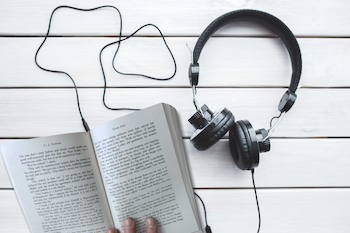

- © 2003 - 2024 Dynamix Productions, Inc. Contact Us 0



“When you read a book, the story definitely happens inside your head. When you listen, it seems to happen in a little cloud all around it, like a fuzzy knit cap pulled down over your eyes.”
Robin Sloan, Mr. Penumbra's 24-Hour Bookstore
We're continuing our series on the audiobook, an older idea that has been reborn from new technology. In Part 1, we began our conversation with veteran actor and audiobook narrator Brad Wills. His foray into narrating books was a little rocky at first, but he soon found his footing. He talked technical details about finding the right studio, performance, editing, and quality. In this issue we're talking with Brad about character development, preparation, and tips for budding narrators.
When Brad is starting a new book to narrate, especially with an author he's unfamiliar with, he likes to get to know the author before recording, "because it helps me understand who they are, and I see their personality in their writing. With Suzan (Tisdale) for instance, I know she is very funny, and I could tell that immediately in the first sample of her book." Brad has worked several authors multiple times. He says that "once you work with an author for a long time, and you know what their writing style is like, you know their storytelling methods, you can basically just get a character breakdown from them, and it will work fine."
But he must understand the content and direction of the story before production begins. "There was a time early on, where one of the first books I did, I blew the entire climax of the book. I didn’t realize what it was. And I went back and listened to it and thought 'I’ve completely messed that up.' So I went back and redid it." He says that one common mistake narrators new to the game make is not being prepared. "If you don’t read the whole book through, at least skim through it and read the highlights so you at least know where it begins and where it ends."
Brad only reads fiction, so one of the age old questions is whether to just read the words, or perform them. "Some listeners do not like a performance, they want to hear a straight read," he says. "A lot of people don’t, they want to hear a performance." It's usually up to the author as to which road to take. The majority of Brad's books are performed, and because most of the novels he reads take place in Great Britain, they are in a British dialect. In fact, he prefers to narrate in that accent because of his years of training and performance as British characters. Most books have many characters, which Brad must develop before recording. Usually, the description of the character leads to finding the voice, which usually involves altering his pitch, mouth, tongue, palate, or breath. One character was described as "enormously overweight and he had black teeth from eating too much white bread," Brad recounted. "So I figured, well this guy is fat and his teeth are rotten. The more I did it, the more it sounded like Alfred Hitchcock. But it was so right for the character - he doesn’t want his teeth to touch his lips because it hurt."
Other times, a character is built upon a favorite actor. While prepping a recent novel for author Kathryn Le Veque, one character, an elderly father, stood out. "Christopher Lee?†he asked her. “Exactly!" Le Veque replied, "That’s exactly who I was thinking of!" Sometimes short-lived characters just need a quick voice. "If I’m doing an elderly Scottish guy, it inevitably comes out as a bargain-basement Sean Connery. But it’s easy to identify." Brad said that early on he felt that he had to come up with a distinct voice for every single character, "no matter how small. Over time I’ve learned that you have your main characters and main supporting characters in a book, keep them distinct. Everybody else can just be a little variation of your voice."
But narrating novels is more than being creative, it's mentally hard work. There's a technique to reading aloud. Brad explains that "there’s a huge learning curve in what I call 'eye/mouth coordination.' When you read, your eye and your brain automatically identify the word, and it’s processed like that," he snaps his fingers. "You don’t sit there and look at every single word when you’re reading," he goes on. "Your mouth doesn’t work that fast. It’s very easy for your eye to get ahead of your mouth. Invariably, that’s what trips me up every single time, because I’ll be looking ahead at other words and my mouth will be a word and a half or a sentence behind."
And because the position of the mouth to the microphone is critical and must remain in the same place for the entire book, it's physically tough. "Your neck gets really stiff. You can’t move," Brad relates. "Your mouth is going to get incredibly dry from all the breathing because you cannot breath in through your nose." Because the narrator's mouth is so close to the sensitive microphone, nose breathing can create whistles, and breathing too heavily through the mouth creates other noises. "They get very irritating for the listener, " Brad explains.
For the budding narrator, Brad offers these tips: